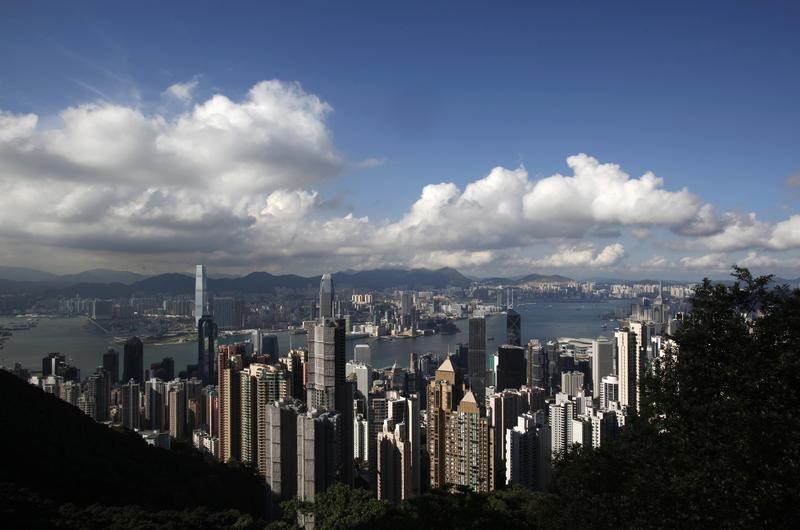(Bloomberg) -- One of the toughest years in decades for Hong Kong is leading many expats to wrestle anew with the question: Do I stay or do I go?
The choice for Hong Kong’s foreign resident community, especially the 90,000 or so people who come from major economies outside Asia, is stark. If they stay, they face renewed disruptions arising from political turmoil amid efforts by China to impose a national security law. To leave is to risk relocation at a time when the global economy is crippled by the coronavirus.
After weathering a year of U.S.-China trade tensions, anti-government protests and the worst viral outbreak since the 2003 SARS crisis on top of the national security legislation announced in May, some are leaning toward the latter. That’s according to surveys and data from local business groups and mobility firms.
While once expatriates in Hong Kong typically worked in finance or law for Western companies and had generous relocation packages, the group is now more diverse so determining a consensus is difficult.
Robert Chipman, chief executive for Hong Kong with the global relocation service Asian Tigers Group, said he saw a spike in interest early this year as people made decisions to leave after eight months of political unrest and the onset of the coronavirus outbreak.
Chipman is concerned that further protests may not only push more foreigners to the exits, but also persuade some who are weighing a move to Hong Kong to avoid the city -- putting its future as an expat enclave at risk.
“If people feel Hong Kong is not a safe place, and there’s civil unrest, even the whisper about that will keep people out,” Chipman said. “On the civil unrest, I don’t see the light at the end of the tunnel there. There’s deep-seated emotions.”
American Worries
The estimated 25,000 Americans in the city face added pressure and uncertainty as a result of the U.S. declaration that Hong Kong is no longer largely autonomous from China, which could potentially strip the city of its special trading status.
A survey conducted June 1 and June 2 by the American Chamber of Commerce in Hong Kong found 38% of about 180 members who participated were personally considering leaving in light of the new national security law. And about 30% said the law is causing their companies to look at moving assets including capital and business operations to other locations.
Joel, a former trader who until recently was based in Hong Kong and who declined to provide his full name, began making plans to leave the city in November after a taxi in which his wife and children were riding was flanked by protesters and police nearby were firing tear gas. The experience shook the family and he hunted for an alternative, settling on Singapore.
“In a calm world, it’s good to be in an exciting place like Hong Kong,” he said. “In a turbulent world, you want to be in a stable place like Singapore.”
Other issues such as the high cost of living in Hong Kong are also a factor. Hong Kong retained its crown as the most expensive city in the world for expats, according to the latest survey from global consultancy Mercer. Rival Singapore fell two spots to fifth.
Despite the growing pessimism there are valid reasons for expats to stay, especially with virus-related travel restrictions making a move difficult -- if not impossible -- right now.
“Am I concerned? I am concerned,” said Martha Collard, a Canadian who has lived in Hong Kong for about 40 years. She runs Red Doors Studio, leading meditation and wellness classes that include using gongs. “But I also feel I have to put things into perspective as well.”
Hong Kong has been successful in containing the coronavirus, with only four deaths and just over 1,100 confirmed cases. Until protests started again in May, it was seen as a safe haven of sorts in 2020. Investors haven’t headed for the exits, as the territory’s dollar-pegged currency continues to see inflows.
Wait and See
Simon Kavanagh, a managing director at investment banking firm BDA Partners, said he has no plans to leave Hong Kong as the national security law won’t affect his day-to-day life. He thinks the changes, however, will curtail future investment in the city.
“For entrepreneurs or executives looking to Asia, Shanghai and Singapore have a lot to offer,” he said. “Hong Kong continues to fall behind in terms of innovation and investment, making it harder to attract capital and talent.”
There is also the question of where to go if expats choose to move, especially for Americans -- with the U.S. grappling with widespread protests of its own as well as virus infections that have topped 2 million cases.
“It’s still an attractive place to live and work, so I don’t think expats are pulling the trigger immediately,” said Renee Conklin, founder of RC HR Consulting. “But I do think that what this has done is lead people to have more serious conversations about what their future looks like in Hong Kong.”
©2020 Bloomberg L.P.
